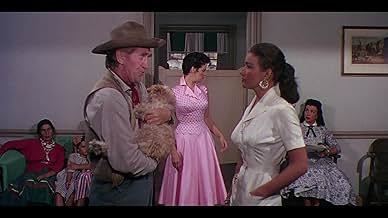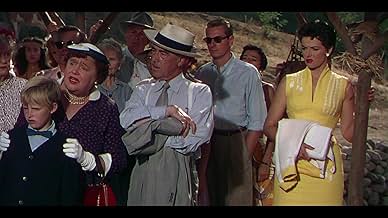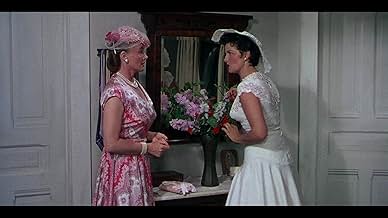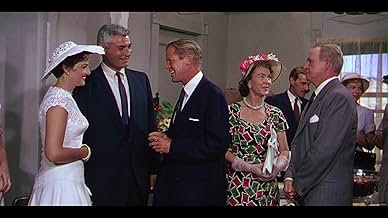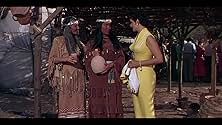In Arizona, during the 1950s, privileged white girl Amanda Lawrence marries half-Apache mining engineer Jonathan Dartland who dreams of finding gold in an old abandoned Apache mine.In Arizona, during the 1950s, privileged white girl Amanda Lawrence marries half-Apache mining engineer Jonathan Dartland who dreams of finding gold in an old abandoned Apache mine.In Arizona, during the 1950s, privileged white girl Amanda Lawrence marries half-Apache mining engineer Jonathan Dartland who dreams of finding gold in an old abandoned Apache mine.
- Old Larky
- (as Eddy C. Waller)
- Indian Woman
- (uncredited)
- Hoist Operator
- (uncredited)
- Mrs. Potter
- (uncredited)
- Mrs. Riley
- (uncredited)
- Miner
- (uncredited)
- Party Guest
- (uncredited)
- Director
- Writers
- All cast & crew
- Production, box office & more at IMDbPro
Featured reviews
Jane Russell seemed well paired with the tall and handsome Jeff Chandler and the locations look authentic enough for the story to hold one's interest. Celia Lovsky, always an actress who could win an audience's favor in the briefest of roles (and, alas, she was never allotted more than a few scenes in most of her films), scores once again in "Foxfire." This is one to watch for if you notice it scheduled on a late-night or early afternoon TV broadcast.
There's a bit of sociology and psychology that gives this movie some depth, but under the direction of Joseph Pevney it turns into another soaper about "love on my terms." Miss Russell seems the nobler for having to chase cockroaches down the sink, but Chandler's obsession is getting an old gold mine up and profitable on the reservation, creating job and wealth for his mother's people. That seems more useful to me; one contemptuous character remarks he has turned down good jobs back East in his futile-seeming quest.
William H. Daniels gets some gorgeous photography out of the beautiful leads and land around Kingman, Arizona. The cast is padded with Dan Duryea in a subplot that does nothing, Mara Corday as the woman who loves him, and the always worthwhile Barton MacLane.
The pretty pictures will keep you interested, but for me the ending, in which Miss Russell returns to Chandler, seems more a matter of what the audience expects than anything else. They appear to have both realized what's wrong with their relationship, but knowing it and doing something about it are two very different things.
Will she and Chandler stay together once they decide to get hitched. That's basically the plot-line, so get interested if you can. Trouble is he's also married to his job at the gold mine; plus, being the swarthy Chandler from a hundred previous Westerns, he's also half- Apache. But more difficult for them, she's a rich girl from the East with a snooty mother, so you get the culture clash idea.
Duryea as the dipso doctor looks like he's having fun. But you do have to believe that somehow he handles the booze bottle with one hand and his patients with the other. Seems like a real stretch to me. Then too, there's the shapely Corday in a tacked-on role. Somehow she manages a fashion wardrobe on a nurse's salary. Oh well, she does have to carve out a glamour spot from the formidable Russell.
Not much really happens in the 90-minutes. But there is a lot of eye candy, especially the bright colors that show up like neons against the desert backdrop. Otherwise, except for the attractive stars, this desert soap opera is pretty much forgettable.
Did you know
- TriviaThis was the last American motion picture to be photographed on the three-strip Technicolor camera (mid-'54) and the last in that process to be released (July '55).
- GoofsPrincess Saba and some of the other Native American characters have overly done dark makeup applied, which was a norm in 1950s Hollywood with the casting non-Native American actors.
- Quotes
Saba: [Indicating, to a tour group, a gathering of young Apache boys on the Reservation] A child here has little contact with his father who, in the old days, was usually away hunting. Today, the father is still much away. He works on the Reservation cattle range. As you see, the little boys play, and have few responsibilities. But there comes a day when they are twelve. Here is a little one, ready to leave his mother and go with the men. From now on, he will work and hunt with the men. Eat and live with the men. He will no longer call his mother "Mother." He will call her by her tribal name, and he will never again be alone with her.
Woman Tourist: Why is that?
Saba: It is our custom. A boy of 12 does not cry, or ask help from a woman. Nor has she need for him. They get along without each other. This is one of the differences in our cultures.
Man Tourist: I had no idea those customs were still followed.
Saba: In this way, we preserve our racial dignity. This little boy will never again cry or be weak. He will rely on his own strength and independence and have no further need of anyone. And now, if you will step this way, the ceremonial dances are about to begin.
- ConnectionsFeatured in Man in the Shadows - Jeff Chandler at Universal (2023)
- How long is Foxfire?Powered by Alexa
Details
- Runtime1 hour 32 minutes
Contribute to this page


